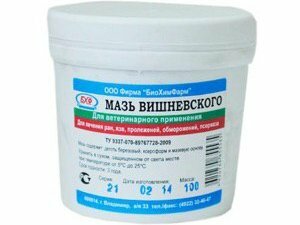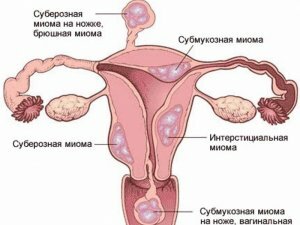Menopause: Symptoms and Recommended Remedies for Menopause
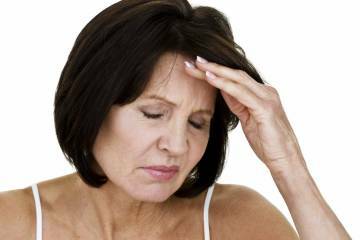
Menopause is attributed to the physiological process in the female body, which signals the onset of aging.It is the result of the extinction of the functioning of the ovaries, when the reproductive period in the life of a woman is completed.Menopause is not considered a pathology, and it is often accompanied by a number of unpleasant symptoms, which negatively affects both the general well-being and the work of many organs and systems.Unfortunately, it is impossible to avoid this process, but it is important to learn how to cope with unpleasant symptoms so that the menopause period passes as imperceptibly as possible.
The second name for menopause is the menopause, or the menopause.The clinical picture and a number of signs, which the woman experiences at the same time, are called climacteric syndromes.
Table of contents:Types and phases of menopause
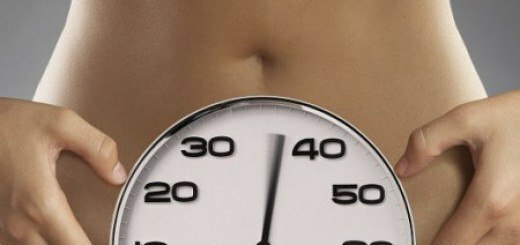
The official classification of the World Health Organization identifies such types of menopause:
- physiological or natural;
- artificially induced as a result of excretion of the uterus( removal), reception of chemotherapy drugs, irradiation with radiation;
- ovarian failure( premature);
- is premature( in women who have not reached the age of 40).
There are three stages of climax:
- Premenopause is a premenopausal period when a woman has a monthly cycle disorder( very frequent, or vice versa, rare menstruation);
- True menopause, which is diagnosed with discontinuation and absence of menstruation for more than a year, which occurs against the background of extinction of ovarian function;
- Postmenopause is the period after the last menstruation and until the end of a woman's life.
The typical age at which a woman can have menopause varies from 40 to 55 years.Most often, it comes after 50. In 9 out of 10 such women, menopause is accompanied by irregularities in the menstrual cycle.
Symptoms of climax
We recommend to read: 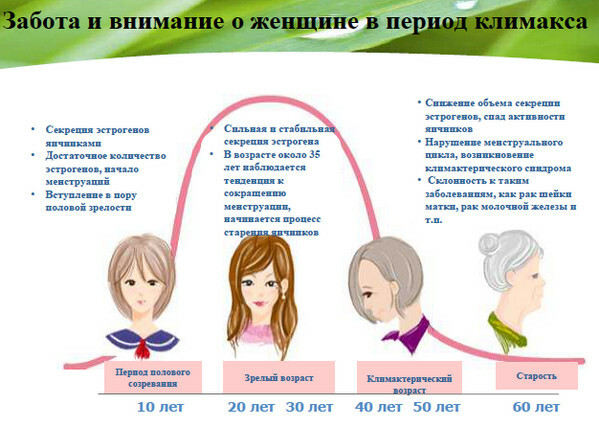
The climax in women lasts about 12 months and comes gradually.During this time, a woman may experience a number of different symptoms of menopause, which manifest themselves at different times.Their appearance requires an unscheduled visit to the doctor, especially if they are very pronounced and bring discomfort.
These include:
- mood lability;
- hot flashes or a sharp feeling of heat;
- increased sweating;
- the disappearance of sexual attraction;
- increase in body temperature;
- headache;
- sleep disorders;
- causeless weight gain;
- insomnia;
- vaginal dryness;
- problems with urination;
- fatigue for no apparent reason;
- muscle pain;
- increased fatigue.
Tides in menopause
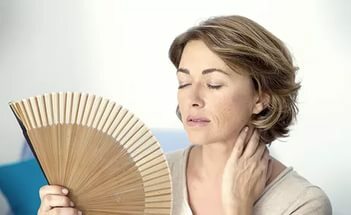 This symptom is observed in 70% of women during menopause.Tides are the appearance of a feeling of excessive heat that spreads through the body.As a rule, it lasts from 1 to 5 minutes and is replaced by a tremor, a feeling of cold, can be accompanied by an increased heart rate.In some cases, the skin color changes along with the tide.In the presence of obesity, hypodynamia, smoking, tides happen much more often than those who lead a healthy lifestyle.
This symptom is observed in 70% of women during menopause.Tides are the appearance of a feeling of excessive heat that spreads through the body.As a rule, it lasts from 1 to 5 minutes and is replaced by a tremor, a feeling of cold, can be accompanied by an increased heart rate.In some cases, the skin color changes along with the tide.In the presence of obesity, hypodynamia, smoking, tides happen much more often than those who lead a healthy lifestyle.
Scientists have not studied the full mechanism of hot tides.There is a theory that this is due to a change in the sensitivity of the hypothalamus in the brain during the menopause, since it is he who is responsible for the processes of thermoregulation.The hypothalamus mistakenly takes the physiological temperature of a woman's body for an elevated one.Because of this, intensive heat release begins, the vessels dilate in the skin, excessive sweating occurs.There is a regularity that the earlier the women's tides began, the longer they will be observed.This period can be from 1 to 10 years.
Proven Tidal Remedies for Menopause
Tides in different women are provoked by different situations.That is, someone they arise after a hot shower, someone after a cup of coffee, etc.In this case, one should simply avoid such situations, so as not to provoke a tidal attack. There are also a number of general recommendations on how to behave in a woman during menopause to avoid hot flashes:
- dressing is easier in hot spaces;
- if possible, use a fan or air conditioner;
- if you are overweight, you should lose weight;
- to quit smoking;
- is very useful for normalized exercise.
If the hot flushes happen very often, you should visit a gynecologist to select a medical treatment.Usually hormone replacement therapy is used: such drugs will help get rid of hot flashes.
Night Sweating with Climax
Tides that occur at night are often accompanied by excessive sweating, which women complain about.Because of this, they wake up, they are disturbed by the quality of sleep.As a result, after a night, a woman feels tired, irritated, and has a bad mood.
What to do for night sweats with the climax
To reduce the frequency and likelihood of night sweats, you should follow these tips:
- before going to bed take a cool shower;
- take cover with a thin blanket;
- one leg should not be covered with a blanket to give off excess heat through it;
- under the pillow, you can put a hot-water bottle with ice and turn it as needed.
Vaginal atrophy as a symptom of menopause
This symptom of menopause occurs against a background of estrogen deficiency.Reducing the number of sex hormones provokes thinning of the walls of the vagina, reducing their elasticity and moisture. This symptom is described by many women as "dryness of the vagina", and it may have other signs:
-
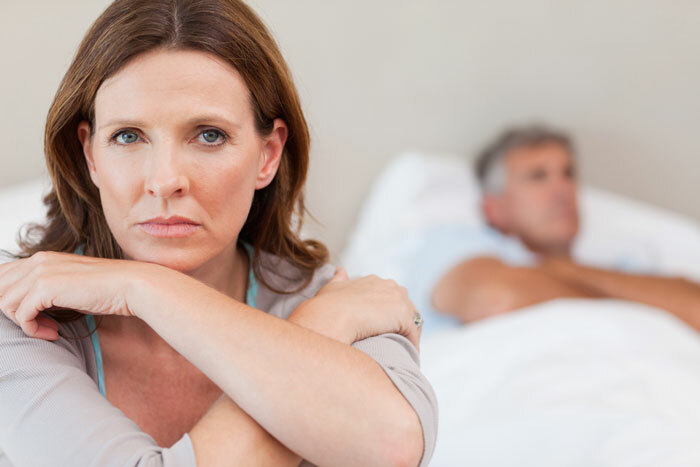 itching( severe) in the genital area;
itching( severe) in the genital area; - pain in the vagina during sex;
- discharge with an admixture of blood that may appear after sex.
What should I do with vaginal atrophy?
It is important to consider that atrophy is an irreversible process, therefore, with the characteristics described above, you should immediately contact a gynecologist.The doctor will conduct an examination to exclude other diagnoses, the symptoms of which may also be similar symptoms. Diagnosed vaginal atrophy requires the following rules of :
- should not abandon sex, because it naturally supports the health of the vagina;
- during sexual intercourse it is recommended to use means for moistening the vagina( they have a long-lasting effect and a natural level of acidity, which additionally protects against vaginosis of bacterial and fungal origin);
- should use lubricants exclusively on a water basis, because others only provoke additional irritation.
Excessive facial hair growth and problem solving
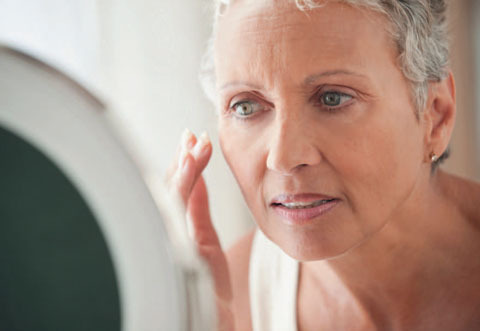 Some women begin to grow hair in the chin area, above the upper lip or cheeks before the onset of menopause.This is also associated with the extinction of ovarian function.Because of the lack of female sex hormones, the roots of the hair on the face become much more sensitive to the action of the male, which in micro doses are produced in the body of every woman.
Some women begin to grow hair in the chin area, above the upper lip or cheeks before the onset of menopause.This is also associated with the extinction of ovarian function.Because of the lack of female sex hormones, the roots of the hair on the face become much more sensitive to the action of the male, which in micro doses are produced in the body of every woman.
If the hair on the face a little, and they do not grow very quickly, you can simply remove them with tweezers.When the hair grows very intensely, it is an occasion to appeal to the endocrinologist.The doctor will conduct an examination to exclude the presence of a tumor produced by male sex hormones.
Frequent infections of the genitourinary system and the solution of the problem
Female hormones are a valuable defense of the body from the multiplication of pathogens in the vagina and urethra. At the onset of menopause, sex hormones no longer have a protective effect, so very often women develop inflammatory processes in the form:
- candidiasis;
- of cystitis;
- urethritis;
- of bacterial vaginosis.
In this case, there are symptoms such as discharge from the vagina, which can have an unpleasant smell, itching and burning.
You should use special intimate hygiene products that support natural pH balance.If the inflammation is repeated often, it is important to visit a doctor.
Weight gain with menopause and treatment methods
Most women in the pre-menstrual period begin to notice that weight is gaining faster, and getting rid of excess kilos is getting harder.There is a theory that this process is triggered by a decrease in the physical activity of a woman, because she spends less energy, and this negatively affects the body weight.
The most correct solution in this situation is regular normalized exercise and proper nutrition.
Problems with urination and treatment methods
Menopause can also cause urinary incontinence and frequent urge to urinate.Scientists believe that this is the result of the same deficiency of estrogen, which has a stimulating effect on the urinary tract.
It is necessary to visit a doctor who will prescribe adequate treatment.
Lability of mood in menopause and solution of the problem
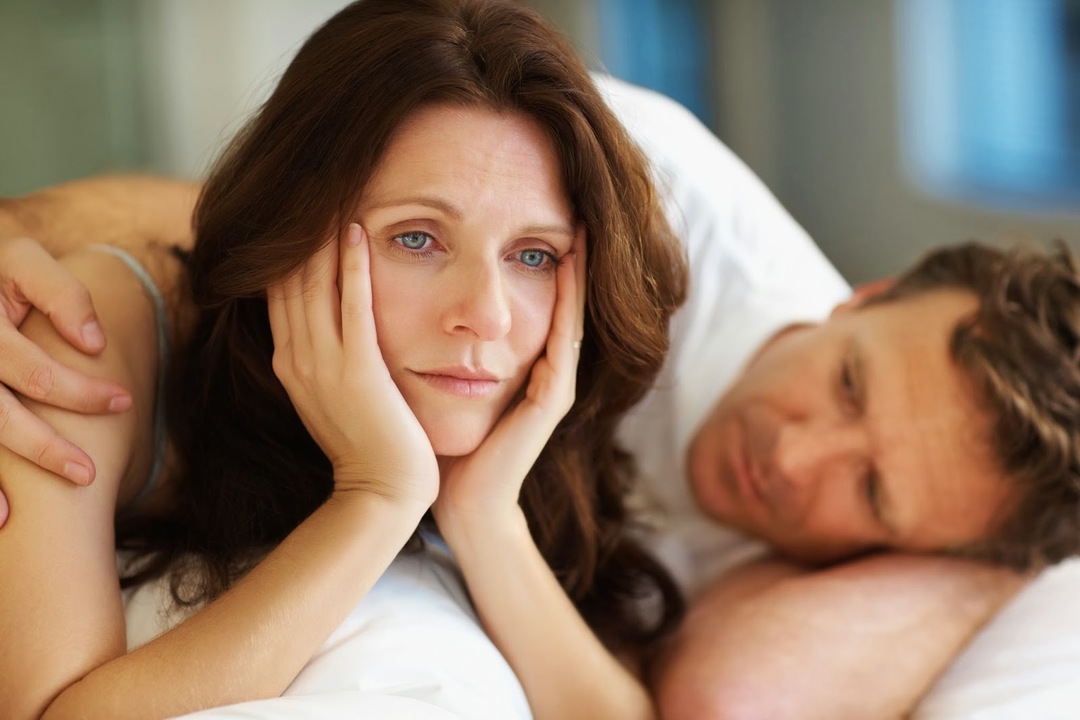 In menopause, women often suffer from depression and increased irritability, but there is no direct connection between the menopause pathomechanism and these symptoms.There is a theory that the reason is night tides, because of which a woman simply does not get enough sleep.
In menopause, women often suffer from depression and increased irritability, but there is no direct connection between the menopause pathomechanism and these symptoms.There is a theory that the reason is night tides, because of which a woman simply does not get enough sleep.
In this case, the right decision is to visit a gynecologist and a psychotherapist.The first will choose a hormone therapy regimen to eliminate the night tides as much as possible, and the second will help restore a stable emotional state if the tides do not disturb at night, but there is irritation and depression.
General recommendations for women in the climax
We recommend that you read:To reduce the severity of symptoms of menopause, it is important to restore the physiological hormonal background and support the body by all available methods:
-
 Include in your daily diet a lot of fresh fruits andVegetables, reduce the number of animal proteins( meat), there must be enough sour-milk products and herbs( this prevents the development of osteoporosis).
Include in your daily diet a lot of fresh fruits andVegetables, reduce the number of animal proteins( meat), there must be enough sour-milk products and herbs( this prevents the development of osteoporosis). - Avoid stressful situations.
- Coffee, as well as black tea, should be discarded, and freshly squeezed juices and herbal teas should be preferred.
- There should be a good rest.
- Complete quitting or at least reduce the number of cigarettes smoked per day.
- It's better to be out in the fresh air.
- Restrict the use of alcoholic beverages.
- To practice fitness, gymnastics, swimming, yoga, etc.Not less than 3 days a week.
- If you have tachycardia, do not go to the sauna and bath.
- It is better to refuse from trips to countries with a hot climate.
Drugs for menopause
 Hormone replacement therapy is most commonly used in menopause.Also its task is the prevention of late metabolic disturbances in the body.Means are always selected individually, taking into account the characteristics of the organism.Usually, these are preparations containing natural estrogens and progesterone, as well as their analogues.It should be borne in mind that such treatment implies a number of side effects, therefore it is inappropriate to prescribe the drug solely a doctor, self-medication is inappropriate in this case.
Hormone replacement therapy is most commonly used in menopause.Also its task is the prevention of late metabolic disturbances in the body.Means are always selected individually, taking into account the characteristics of the organism.Usually, these are preparations containing natural estrogens and progesterone, as well as their analogues.It should be borne in mind that such treatment implies a number of side effects, therefore it is inappropriate to prescribe the drug solely a doctor, self-medication is inappropriate in this case.
Hormone therapy for women in menopause is strictly prohibited in the presence of such conditions:
- suspected of breast cancer;
- thrombosis;
- breast cancer in anamnesis;
- pathology of autoimmune genesis;
- bleeding from the genital tract without a clear cause;
- liver disease;
- endometrial hyperplasia without adequate treatment.
Phytomedication is also used in the therapy of symptoms of menopause.They contain phytohormones that perfectly fill the deficiency of personal female hormones.Contraindication to and reception is estrogen-dependent neoplasms.It is not recommended to take such drugs for a long time.
For more information on the symptoms of menopause and methods of alleviating the condition of women in this period, you will get by viewing this video review:
Viktorova Julia, obstetrician-gynecologist

